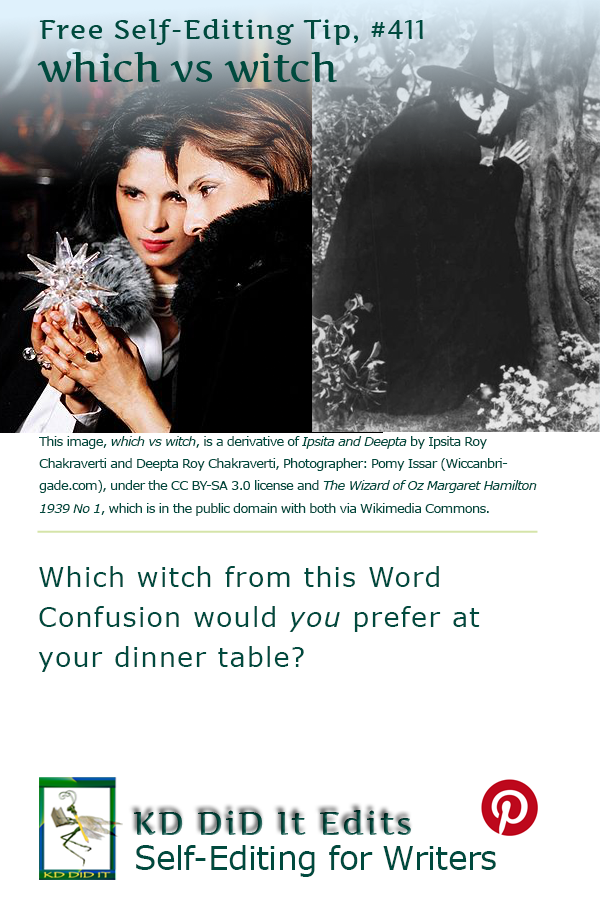Revised as of
12 Jan 2023
Sure, you can always ask which witch when you encounter more than one witch, but it doesn’t mean the two heterographic words can be used interchangeably.
Word Confusions . . .
. . . started as my way of dealing with a professional frustration with properly spelled words that were out of context in manuscripts I was editing as well as books I was reviewing. It evolved into a sharing of information with y’all. I’m hoping you’ll share with us words that have been a bête noire for you from either end.
If you found this post on “Which versus Witch” interesting, consider subscribing to KD Did It, if you’d like to track this post for future updates.
| Which | Witch |
|---|---|

Contrasting Body Types is Mykewolf9’s own work under the CC BY-SA 3.0 license, via Wikimedia Commons. — To which body type do you belong? |
Witch Doll by Jeanne Boleyn at en.wikipedia. Later version(s) were uploaded by Midnightblueowl at en.wikipedia and are in the public domain, via Wikimedia Commons. |
| Part of Grammar: | |
| Adjective, interrogative or relative; Pronoun, interrogative or relative; Determiner, a.k.a. Identifier, nonrestrictive |
Adjective; Noun; Verb, intransitive & transitive
Plural for the noun: witches Third person present verb: witches |
| Best to use WHICH for nonrestrictive or nonessential clauses, although it is used for essential clauses too.
CAUTION: Use a comma before which when it’s a nonrestrictive pronoun. Determiner, aka, Nonrestrictive Identifier or Non-definite Article: Used with a noun in requesting that its referent be further specified, identified, or distinguished from the other members of a class Whatever of a class
Used in relative clauses with inanimate antecedents Interrogative Adjective OR Pronoun: Relative adjective OR Pronoun: |
Adjective: Of, relating to, or designed as protection against witches Noun:
[Informal, derogatory] An ugly or unpleasant woman A girl or woman who is bewitchingly attractive An edible North Atlantic flatfish, Glyptocephalus cynoglossus, that is of some commercial value Verb, intransitive:
Verb, transitive: [Archaic] To affect as if by witchcraft
Cast an evil spell on
|
| Examples: | |
| Nonessential Which | Adjective: Brrr, it’s colder than a witch’s tit out here! “Indeed, this 2016 intimate-scale opera is set during the McCarthy era witch hunts when gays in government were being hunted down” (Hirschman). “This breakdown can also lead to witch hunts in which legitimate players are accused of cheating because players don’t trust that the system is fair” (Orland). Noun: Elena is a Wiccan and therefore, technically, a witch. He can marry the old witch for all I care. That’s the old witch who used to be our neighbor. She can be a real witch. A witch flounder can be eaten steamed, fried, microwaved, or baked. Verb, intransitive: She’s witching for us. We needed a new well, and Bill went out witching for us. Verb, transitive: Mrs. Yvonskly had somehow witched the house. She witched Jake. |
| Determiner: The lawnmower, which is in the shed, is broken. There is only one lawnmower in the shed, so there is no essential need to differentiate. Your claim ought to succeed, in which case the damages will be substantial. Substantial damages can be implied if a claim is successful, therefore which is nonessential. The house, which is old, is in poor repair. Relative Adjective: Relative Pronoun: Mary and I went to the movies last night, which got out at ten. |
|
| Essential Which | |
| Determiner: Which way is the wind blowing? Which house did you want to buy? Which did you find? I wondered which apples were cheaper. Bring which car you want to drive. Adjective, interrogative: “How can you govern a country which has 246 varieties of cheese?” (Nordquist ) Pronoun, interrogative: Which of the suspects murdered her? Adjective, relative: I was going to take a class which wasn’t necessary for my degree. Pronoun, relative: Percy is the horse on which he had ridden. You may choose which you like. Choose which of the cars suit you. |
|
| Derivatives: | |
| Adjective: witchier, witchiest, witching, witchlike, witchy Adverb: witchingly Noun: witchcraft, witchery, witchhood, witching, witchweed, underwitch |
|
| History of the Word: | |
| Old English hwilc, which is from the Germanic bases of who and alike. | Old English wicca (masculine), wicce (feminine), wiccian (verb). The current senses of the verb are probably a shortening of bewitch. |
C’mon, get it out of your system, bitch, whine, moan . . . which words are your pet peeves? Also, please note that I try to be as accurate as I can, but mistakes happen or I miss something. Email me if you find errors, so I can fix them . . . and we’ll all benefit!
Satisfy your curiosity about other Word Confusions on its homepage or more generally explore the index of self-editing posts. You may also want to explore Book Layout & Formatting Ideas, Formatting Tips, Grammar Explanations, Linguistics, Publishing Tips, the Properly Punctuated, Writing Ideas and Resources, and Working Your Website.
Resources for Which versus Witch
Apple Dictionary.com
Dictionary.com: witch
Hirschman, Bill. Sun Sentinel. 25 Apr 2022. Web. 12 Jan 2023.
Nordquist, Richard. “Definition and Examples of Interrogative Words in English.” ThoughtCo. Updated 16 Aug 2019. Web. n.d. <https://www.thoughtco.com/interrogative-words-term-1691182>.
Orland, Kyle. “Stop Treating Cheaters in Online Games as ‘the Enemy’.” Ars Technica. 24 Mar 2022. Web. 12 Jan 2023. <https://arstechnica.com/gaming/2022/03/why-do-people-cheat-in-online-games-and-what-can-we-do-about-it/>.
Pinterest Photo Credits:
Ipsita and Deepta by Ipsita Roy Chakraverti and Deepta Roy Chakraverti, Photographer: Pomy Issar (Wiccanbrigade.com), is under the CC BY-SA 3.0 license and The Wizard of Oz Margaret Hamilton 1939 No 1 is in the public domain, with both via Wikimedia Commons.


